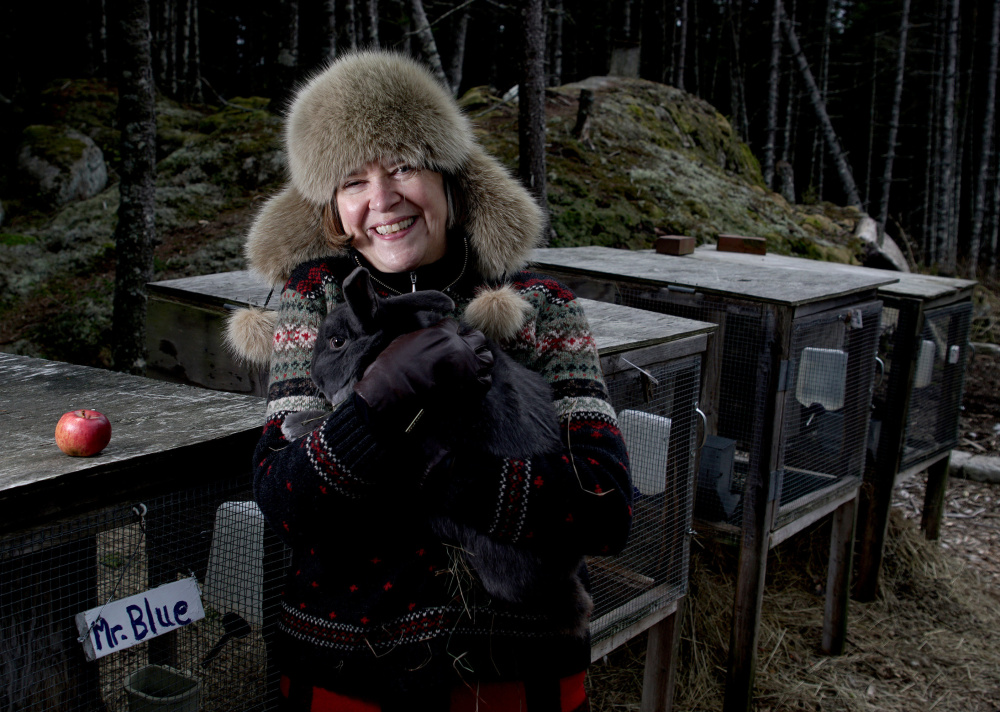Cheryl Wixson is still described as “MOFGA’s resident chef” on the Maine Organic Farmers and Gardeners Association’s website, but she’s been easing out of those duties over the course of this year.
She claims to be retired from the post (even if you could have caught her moderating a Kitchen Licensing Workshop at MOFGA’s headquarters in Unity this past week). However, after talking to her about the community dinners she plans and cooks for 300 Deer Isle residents nine times a year, life on her farm in Stonington and her food processing classes, we are convinced that retirement is not a concept she thoroughly grasps.
ROOTS: Wixson was the first woman to get an agricultural engineering degree from the University of Maine. That was 1976. She’d spent her formative years on her father’s dairy farm in Winslow and though he sold the farm and became a teacher when she was in second grade, her love of agriculture was already ingrained, and it flourished in college. She’s still a major booster. “I don’t think we brag about the university enough,” she said.
RUSSELL CALLING: She began working with MOFGA’s longtime executive director Russell Libby more than a decade ago on programs oriented toward getting more local foods in schools. He’d called her because she was teaching cooking to kindergarteners in Bangor. She convinced him that MOFGA was the perfect place to encourage schools to practice what they were preaching. She brought in food service staff from schools to give them an opportunity to work with “real food, whole grains,” things that didn’t involve opening cans or boxes of prepared, processed foods. From there, the idea of a teaching kitchen at MOFGA grew to what it is today.
CLOUDS AND SILVER LININGS: Her work with local foods has been fulfilling, but that doesn’t mean she hasn’t experienced disappointment. Wixson’s company, Cheryl Wixson’s Kitchens, was one of the major tenants at the Coastal Farms and Food hub in Belfast, which went under in 2014 after two short years.
It was meant to be a place where small producers could enjoy the benefits of a shared commercial kitchen and production area, but the financing wasn’t there. She’d been buying from 63 certified organic farmers, and in bulk (like 20,000 pounds of apples to produce jars of applesauce made from 16 different varieties of Maine fruit), and with 30 days notice had to tell them she had lost the space to work in.
“I am still dedicated to everything I do. You have to look at the silver lining.” Which is, staying on the island, living the “old hippie” lifestyle and doing things like having competitions to see who can grow more corn or catch more mackerel.
LESSONS LEARNED? What are her thoughts on how to do it better in the future? Go beyond shared space and use shared produce and ingredients as well. Buy in bulk from farmers. “We need to do aggregation first,” she said. “Bringing it all together.” Say bring in thousands of pounds of apples and squash, process them using basic preservation methods and then let the value-added oriented businesses share the ingredients to make whatever they please. But that’s a task she’ll likely leave to others.
“Really what I do now is education. I teach people how to process and produce. I’m like the top cheerleader on Maine food.”
FARMER MCGREGOR: She’s still making some of her Cheryl Wixson products, using commercial kitchens like the one at the Orland Community Center. And she’s building her own commercial kitchen at Rabbit Hill, her farm in Stonington. The walk-in cooler from her Coastal Farms and Food business is there, as well as the walk-in freezer, and she’s experimenting with new products, such as rabbit pâté and rabbit pot pies from the animals she’s raising.
Right now she’s down to nine fryers (young male rabbits). They’d have been slaughtered in late November, but she got distracted when her husband took a deer. “He has got to butcher that. It takes precedent.” The first venison meal will also involve a Hen of the Woods mushroom from a friend in Blue Hill. “My mother says she has never seen two people spend more time on their next meal than us.”
DINNER IS SERVED: Wixson celebrated Thanksgiving twice this year, once with her family and once with 287 residents of Deer Isle, that second meal through the program she organizes and runs called Dinner Is Served. The community dinners happen nine times a year and include goods from local farms.
For her Giving Thanks Fall Supper, Wixson ordered turkeys from Tide Mill Farm in Edmunds, roasted turnip and butternut squash, whipped up honey-oatmeal rolls and made blueberry cobbler. Residents pay nothing, and Wixson cobbles the meal together with the help of volunteers, community groups and the like. Especially important to her is making sure that shut-ins get a good meal.
ABOUT THAT RETIREMENT: Fine, she agrees with us, she’s not really resting on her laurels. “When I say ‘retired from MOFGA,’ what it basically means is I don’t drive two hours to work anymore.”
Send questions/comments to the editors.




Comments are no longer available on this story